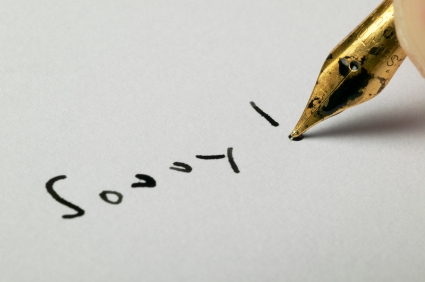"To forgive but not forget sounds a lot like not forgiving to me"
- (I've forgotten who said this)
In my last post I spoke of the impossibility of making amends for doing harm or causing hurt. It might be worth just thinking back though to the last time someone apologised when you were hurt by something that person said or did - intentionally or otherwise. I'm willing to bet (and I'm a notoriously skeptical gambler) that across all the people reading this and asking themselves how they felt at that time, that there was a fair variety of response. Many I suspect will have felt grateful for the acknowledgement. Perhaps some people had a sense of balance being restored, and healing happening. Some conversely may have felt newly angered as memories of the original hurt came back. Some may have even felt victorious and superior.
But none of these depended very much on the fact or manner of the apology per se, rather they depended on the internal process of response to that apology. What we feel, our response, is ours, and is determined by a combination of all the lessons we have learned and absorbed - our conditioning if you like - and decisions made in that moment, and is not really reliant on the domain of the apologiser.
Same with any communication really. If you say hurtful things to me and I get hurt well then that might be fairly predictable as an outcome but still, it's really because I have been conditioned to respond that way (it's an evolutionary need to train our young to have negative responses so they can act appropriately in a crisis) and further that I didn't manage to step back fast enough into my more detached consciousness and realise that these things being said are far more reflective of the person speaking than I.
So I'm not saying that apologies are in any way a bad thing, or that we might not need them for a smoothly functioning society. What I am saying is that the power resides always with the respondent. The apologiser cannot enforce a forgiveness, nor can they make us be healed. We must allow that to happen in ourselves, and if we have decided that an apology, or justice, or some form of action from another is necessary for our healing to occur then we're in a pretty disempowered place at that moment, aren't we? Making amends can be a part of our process of healing certainly, but requiring amends of others is, well, unfair. It assumes they have to be as conscious or aware or present as we are, and really, who are we to impose that on another?
Making an amendment to how we remember a hurt; running that memory so that perhaps the colours are a bit brighter in replay, or there is a happy tune playing in the background, or even just simply speeding up the film of a long and depressing memory can be perfect ways of being true - letting what happened always have happened - but changing how we emotionally respond to it should we be triggered to replay the memory. Healing the feeling.
So in a very real, personal sense, there are no apologies necessary.
But I'm sorry if I misled. ;-)
.



I like the term 'excuse me' or the Italian 'Mi Scusi' and 'mi dispiace' (which basically means one is displeased with one's actions). Excuse is the opposite of accuse, so in that sense it means 'please turn your accusation, rightly placed as it may be, into ex-accusation'. Forgiveness perhaps. Of course excuse is unfortunately used to mean one had a reason to act nastily or carelessly. I recently had the fortune of breaking a barrier of anger and contempt bewtween myself and another friend and colleague and what was interesting was the complete lack of any words like 'sorry' or 'apologise'.
ReplyDeleteHow about regret Aadhaar? There's a topic for an even bigger blog! When someone tells me they've done nothing they regret, I feel on the one hand 'good for you' and the other 'utter bullshit, thta's not possible.'